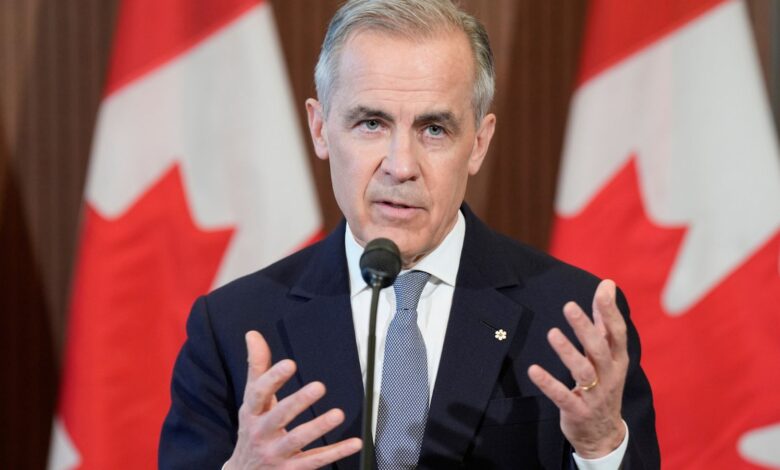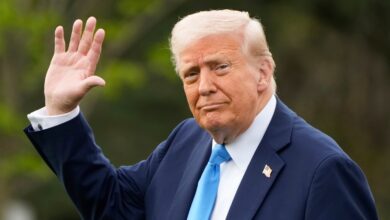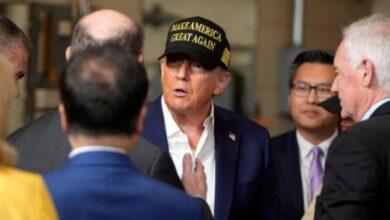‘Old relationship with US is over’: Canada PM Mark Carney amid row over Trump’s tariffs on cars and parts | World News

Canada’s Prime Miner Mark Carney announced on Thursday that the era of deep economic and security ties with the United States “is over,” as global backlash mounts against President Donald Trump’s new tariffs on car imports. Governments from Europe to Asia have hit out against the sweeping tariffs, with some nations warning of potential retaliatory measures.Carney told reporters that Trump’s actions had permanently changed relations between Canada and the US. “The old relationship we had with the United States based on deepening integration of our economies and tight security and military cooperation is over,” he said, adding that future trade deals would not return things to the way they were.
Trump announced on Wednesday that a 25 per cent tariff on imported cars and car parts would take effect on April 3, a move expected to disrupt global supply chains, drive up prices, and fuel trade tensions. The U.S. imported nearly $475 billion in cars last year, with significant volumes coming from Mexico, Japan, South Korea, Canada, and Germany.
Story continues below this ad
Carney condemned the tariffs as “unjustified” and in violation of exing trade agreements. He vowed to fight the US measures with retaliatory actions that would have “maximum impact in the United States and minimum impacts here in Canada.” Canada is expected to introduce its own countermeasures next week.
A possible Trump-Carney call?
Carney has called a meeting with provincial premiers and business leaders to strategize a response. He also revealed that Trump had reached out to schedule a call, expected in the “next day or two.” If it happens, it will be their first direct conversation since Carney took office.
Carney maintains that Canada must reassess its economic future. He stressed that the country can sustain an auto industry despite US tariffs, provided the government and business community collaborate to “reimagine” and “retool” the sector.
Trump’s auto tariffs: Why do they matter?
On Wednesday, Trump announced a 25 per cent tariff on cars and car parts imported into the United States. The tariffs, slated to take effect on April 3, apply to both finished vehicles shipped into the US and to imported parts used in American assembly plants. The move, intended to bolster US auto production, is, however, expected to increase prices across the automotive market.Story continues below this ad
“Anybody who has plants in the United States, it’s going to be good for,” Trump said during remarks at the White House. However, the imposition of these tariffs has rattled markets, particularly in the auto sector, and could create significant disruption for global manufacturers and consumers alike.
The new tariffs would affect all brands, both foreign and American, with domestic companies such as General Motors and Ford Motor Company among those impacted. Both manufacturers assemble cars in neighbouring countries like Canada and Mexico. The tariffs could inflate the cost of new cars and disrupt supply chains that have been honed for efficiency.
Trade war and global reactions
The shockwaves of Trump’s decision are being felt far beyond Canada. Leaders from Europe to Asia have condemned the move, warning of broader economic consequences.
French President Emmanuel Macron warned of inflationary effects and job losses. “They disrupt value chains, create an inflationary effect, and destroy jobs. So it’s not good for the US or European economies,” he said.Story continues below this ad
Germany’s Chancellor Olaf Scholz called the move wrong. “Washington appears to have chosen a path at whose end lie only losers,” he said.
The European Commission, British Prime Miner Keir Starmer, and leaders in Poland, Japan, and South Korea have all voiced opposition, with South Korea announcing an emergency response plan.
Canada elections around the corner
With Canada’s general election weeks away on April 28, the tariffs have become a major campaign issue. Carney has shifted his schedule to focus on the crisis, while opposition leaders weigh in.
Unifor auto workers stand behind Liberal Leader Mark Carney as he speaks during a campaign stop at the Ambassador Bridge in Windsor. (Photo: The Canadian Press via AP)
Conservative leader Pierre Poilievre called the tariffs “unjustified and unprovoked.” NDP leader Jagmeet Singh, visiting auto hub Windsor, Ontario, accused Trump of launching an illegal trade war.Story continues below this ad
Meanwhile, Trump escalated his rhetoric, warning Canada and the EU against retaliating. “If the European Union works with Canada in order to do economic harm to the USA, large-scale tariffs, far larger than currently planned, will be placed on them both,” he wrote on Truth Social.
(With inputs from BBC News, The Guardian, Reuters, Agence-France Presse)







